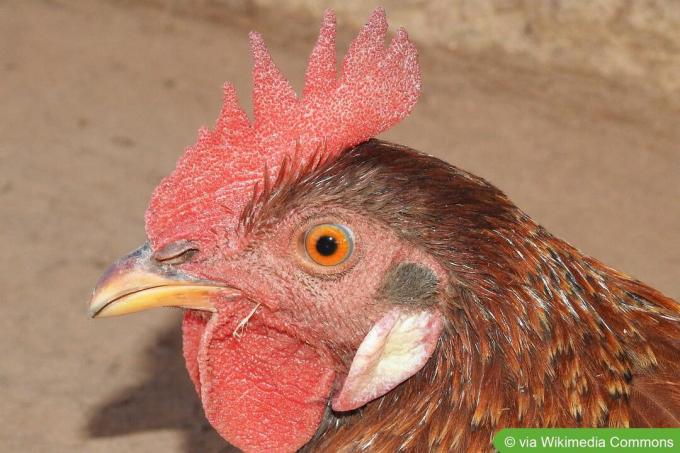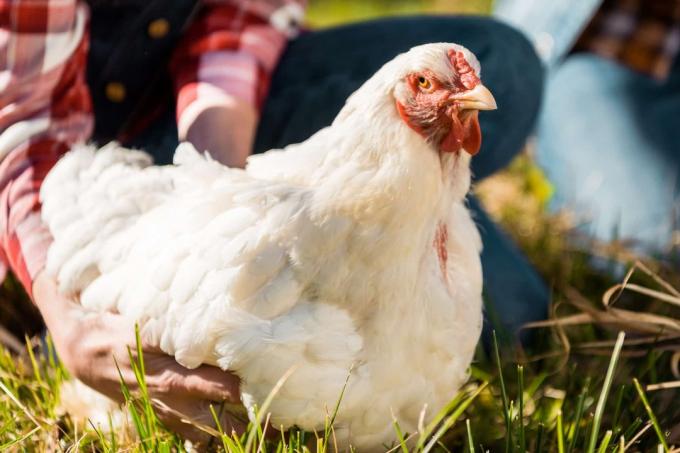

Table of contents
- Marek's disease
- What to do?
- Muscular wry neck (torticollis)
- What to do?
- neck injuries
- What to do?
- ear infection
- What to do?
- frequently asked Questions
When chickens suddenly tilt their heads, there is usually a serious reason behind it. Here you can find out what can be responsible and what action should be taken if a chicken turns its head.
Marek's disease

Source: Lucyin, Maladeye Marek pate sitindowe divant, Edited by Home Garden, CC BY-SA 3.0
Next to bird flu, Marek's disease is one of the most feared viral infections in chickens. This is a (herpes) virus disease with a pathogen from the Mardivirus genus. Even the smallest chicks can become infected. The virus is considered highly contagious and can kill all stocks.
The disease manifests itself in different ways. A trait may be a twisted, crooked head posture. This results from a throat paralysis that can be caused by the virus. The head usually hangs completely forward and bobs uncontrollably when the affected chicken is turned in different directions.
Other symptoms are also possible, which is why a chicken that turns its head should definitely be checked for:
- changed pupil shapes
- animals lose weight
- Pressure on internal organs visibly causes chicken pain (indicates cancerous cell proliferation on organs)
- Chicken limps due to nerve damage
What to do?
If head/neck paralysis is suspected, the animal must be isolated immediately and presented to the veterinarian. Above all, it is important to act immediately if one or more of the symptoms mentioned are also recognizable, which could indicate Marek's disease. The younger a chicken is, the lower the chance of survival. So far, there are no promising drugs. Vigorous, healthy, older chickens occasionally survive viral infection. The best treatment is prevention through vaccination on the day of birth.
If the vet confirms Marek's disease, the following measures should be taken immediately:
- relocate all chickens that shared the same territory with the sick chicken
- Check remaining chickens several times a day for any symptoms
- Separate chicks and weak chickens from adult, strong chickens
- Thoroughly clean and disinfect chicken coop
- Lime the outlets, dig up and sow again
- fences and thoroughly disinfect other objects such as troughs
Tip:
Most conventional disinfectants only work against bacteria. Special disinfectants must be used for this stubborn and aggressive virus. The veterinarian can provide advice here.
Muscular wry neck (torticollis)

Source: L mahin, Fåsse pesse toirtchaedje co2, Edited by Home Garden, CC BY-SA 3.0
Muscular wrynecks in chickens can result from a bacterial infection. The bacterium "Pasteurella multocida" spreads and causes damage to the central nervous system. As a result, the signals no longer work properly and there is a movement disorder, causing the chicken to turn its head. Other typical symptoms in addition to the crooked position of the chicken head are:
- loss of balance
- Decrease in ability to fly
- uncoordinated movement
- reluctance to eat
- tip over
- unprovoked wing flapping (normal response to trying to balance)
What to do?
Bacterial infections can be treated well with antibiotics if they are detected early. The therapy should be left to the veterinarian, who in acute cases will inject the antibiotic for a faster effect. In addition, veterinarians often administer vitamin B supplements, which support the regeneration of nerve cells and normal nerve function. In addition, all whereabouts of the sick chicken must be disinfected after it is isolated.
neck injuries

If a chicken twists its head, injuries in the neck area, such as those caused by fights with conspecifics, can also be a reason. These range from muscle strains to cervical fractures. As a result, affected chickens are no longer able to keep their heads straight. As a rule, the head is "only" turned to one side and does not fall over completely. In addition, the chickens are usually instinctively calm and avoid movements, also because of possible pain.
What to do?
Chickens with neck injuries should be given a quiet place. If all the factors mentioned so far can be ruled out, the chicken should be observed further. Muscle strains often resolve on their own. However, if the chicken shows clear signs of severe pain, the veterinarian should be consulted as soon as possible.
ear infection

Chickens can get ear infections, although this is rare due to the feathered cover. To check this, lift the spring ring on the side of the head in the direction in which the head tilt is pointing. The ear hole is behind the feather wreath. Severe redness indicates inflammation. Yellowish pus can also be seen. Ear infections are mainly due to the following causes:
- Obstruction of upper respiratory organs by tumor or foreign body
- cold draft
- bacterial infection
- Ear wound from injury
- Irritation from heavy soiling
What to do?
If the cause is not clear, self-medication should not be used. The veterinarian should be consulted for diagnosis and appropriate treatment initiation.
A notice:
Chicken ears can also get dirty. We do not recommend cleaning these yourself or performing ear irrigation. For this, too, contact the relevant specialist personnel.
frequently asked Questions
There are two ways to reduce the risk of infection with bacteria and viruses. First, vaccinate all animals as early as possible. If new chickens are added, they should first go through a two or three-week quarantine. A high standard of hygiene is extremely important and wounds must be disinfected quickly.
When in extreme pain, chickens emit cries of pain. These are similar in sound to their alarm call, but quieter and more subtle. In addition, the head and neck often tremble, cramps and an unsteady gait can occur. Many chickens also "excitedly" flap their wings or legs, for which they lie on their side. Some appear paralyzed when the pain is severe.
 Mirko
Mirko
Learn more about pets

Common chicken diseases with symptoms + pictures
Chickens are low-maintenance animals, but they are not immune to diseases. Parasites, viruses or bacteria can cause them problems and serious illnesses are even notifiable. Here you will find the most common chicken diseases with symptoms and pictures at a glance.

Chicken tilts to the side: balance disorder?
Keeping chickens in your own garden is becoming increasingly popular. All you need is enough exercise and a winter-proof stable. Unfortunately, chickens are not the most robust creatures. For example, if a chicken repeatedly falls to the side, it can be due to an imbalance, but it can also be worse.

Bird Names: 348 Popular Budgie Names
If you have budgies as pets or are planning to get two parakeets, the exciting task ahead of you is naming them appropriately. In this text you will be presented with various budgie names to help you choose of a name that suits both your feathered friend and your personal taste fits.

441 guinea pig names from cute to funny
A suitable guinea pig name can not only be a fun or cute addition, but also a way to create a special bond with your little furry friend.

Turtle Names: 473 Names for Turtles
Finding an appropriate name for your turtle can be a fun and meaningful task. A well-chosen turtle name can underline your friend's personality and uniqueness and create a special bond between the two of you. Whether you're looking for male, female, or gender-neutral names, you'll find a wide range of names for your […]

Chicken can no longer walk: what to do?
A chicken is more likely to become unable to walk, limp, weak on its feet, or sag its hindquarters. Then you need to research the cause in order to be able to react correctly.

